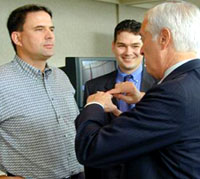|
|

Joe Barette, Vice President of Vitessa, chats with Will Einstein and Bob Vallat after Friday's meeting.
|
Joe Barette, co-founder and Vice-President for Marketing of a Seattle-based company, Vitessa Corporation, set out to explain why there’s FUD in the new markets being created by the
Internet. FUD, for your information, stands for “Fear, Uncertainty, and Doubt.” The growth of the Internet, as we’ve learned in past weeks, has a phenomenal growth track building toward a $100
billion market, “yet consumer trust is low,” said Joe.
Barette first established that his listeners were risk-takers by posing a few general questions. The BBRC appears to be taking the Internet in stride,
logging on regularly and buying items off the Net. “It is safe to use your credit card, but there are some ‘dirty little secrets’ we must talk about.”
“It’s safer to use your credit card on an Internet purchase than it is in a restaurant or gas station,” intoned Barette. “Merchants own 100% risk of
payment fraud, but only 50% are aware of this fact, which is why we have a problem. Banks have off-loaded the risk to merchants, but few merchants are actively managing the risk and are hurting their own
business.”
“Although it hasn’t become a regular happening, a professional who knows computers can run a list of fraudulent credit cards in a matter of
minutes. They run the list until one is accepted by the credit institution and then they charge up many items in a short span of time. Recognize that
there are people out there going about fraud,” Barette warned.
The solution to the problem is managing the risk. Barette said management will reduce the risk, increase revenues, and increase customer satisfaction
and trust. “Business people need to distinguish a good transactions from a bad one. Merchants are trying to serve customers but can’t tell the good
from the bad. What they need to do is go find superior risk management techniques.”
He listed a few dos and don’ts: “Don’t accept FUD from Fraud Prevention Vendors. Do actively manage the risks. Get in collaboration with other industry leaders and contribute to high levels of trust with
consumers.” Barette described a situation where merchants, through suspicion, are rejecting a good customer’s offered payment, while trying
to weed out the real culprit. “They may be rejecting 10% of their business trying to stop just 1% of the fraud. That’s why consumers have made the trust factor such an issue.
Security, privacy, and risk management are all part of this new way of doing business. Barette’s company does risk management with a specially
devised “scoring engine,” which identifies risky card numbers. When asked about the use of debit cards, Barette said that a debit card “is not
as secure as a credit card … it’s almost a cash transaction. The credit card has another level of security with the bank as the risk manager.”
Rourke O’Brien had a bad billing experience, where a large amount was charged to his credit card. He cautioned members to look at your bills and
certify that the charges are yours. Barette closed by saying that every company who is doing or plans to do business on the Internet should have
a privacy policy and that it be offered up-front to their customers. Becoming conversant with the issues of fraud will help merchants and customers alike.
Thanks to Steve Goldfarb for his introduction.
|

